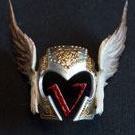-
Posts
13,102 -
Joined
-
Last visited
Current Mood
-
Mellow
 Last update Tuesday at 08:50 AM
Last update Tuesday at 08:50 AM
Story Reviews
- Rank: #0
- Total: 260
Comments
- Rank: #0
- Total: 4,626
About Bill W

Favorite Genres
-
Favorite Genres
Fantasy
Profile Information
-
Topic Display Title
Member Title
-
Location
GA
-
Interests
varied... music, movies, sports and interesting people...
Recent Profile Visitors
88,364 profile views
Bill W's Achievements
-
I'm sure you could redesign the interior of a violin case to fit almost any instrument, although some might require partial disassembly to make it happen, but I stated that they were thought to have carried them in the duffel bags, although a stiff sided variety, rather that a cloth variety, that they wee using to collect the valuables in. They took an idea from the past, possible the gangsters of the Roaring 20s, and just updated it a bit. I thought about the fact that chilling the wine wasn't necessarily appropriate, but I didn't feel the family as being true connoisseurs and probably wouldn't enjoy the wine if it wasn't chilled. Personally, I prefer my wine at room temperature, but not everyone does, and I know those types of ice buckets on stands are more appropriate for champagne. As far as your comment about a marksman compared to someone using an automatic weapons I offer this observation: I agree with the person you're quoting, but I would add this. I don't believe fully automatic weapons, or those that can be modified to become fully automatic, belong in civilian hands. They are weapons of war and belong in the hands of the military, and in some instances law enforcement, but they shouldn't be generally available to anyone.
-
Thank you, Night Auditor, for your support and I'm sorry to put you on a cliffy on my returned, but that was planned before I disappeared for a few weeks. You, and my other loyal readers, just happened to be the recipients of that bad timing. 😞
-
It's possible that some of the older men on his site had a dowdy old aunt when they were younger. Some female teachers from the late 1800s and early 1900s may have been labeled as being dowdy, but that might have been due to the low salary they were paid, which wouldn't have allowed them to buy the most fashionable clothes.
-
The word "dowdy" comes from Middle English doudi or doude, a term for a "shabbily dressed woman" or "unattractive woman" from the late 14th century. The origin of this Middle English word is uncertain, but it likely arose in the late 16th century and is possibly related to words for "fading" or "poorly dressed". One theory suggests a link between the word "dowdy" and "dowager," possibly connecting the unfashionable appearance with widowhood. According to the Oxford English Dictionary (OED), the noun "dowdy" was first used in the late 1700s, with its earliest evidence from 1778. The adjective form was first used even earlier, in 1676, though it was first recorded as a noun in 1581. Examples of "dowdy" used in a sentence: "How else to explain her deglamorized look and dowdy outfit?" "She played a dowdy old woman in the film." "In all the old movies the ministers' wives are kind of dowdy and stodgy." "Even the most dowdy of outfits can undertake a stunning transformation when teemed with some high fashion jewelry." "A bad fit can turn any canine formal wear dowdy in a heartbeat, so it's important to take your dog's measurements before you choose a size."
-
Sorry, drs. I guess I miss this comment too. I guess I'm still not quite with it yet. Still losing focus on responding to these message. Thanks for posting that for those that might be interested.
-
Sorry that I bypassed you, Chris, but better late than never. And thank you for the well wishes. Yep. Hail, hail the gang's all there. Let's see if they can find a way out of this mess.
-
Whoops, I almost skipped you and Chris, Danilo. And thanks for your well wishes. Yes, Mac finally gave Clint some rules and hopefully he'll stick to them now. Oh, my. Did I leave you guys hanging? I'll quickly put down some of those stuntman inflatable cushions until the next chapter comes out so none of you get hurt. 😜 I hope that last comment wasn't facetious!
-
Thank you, Lee. Are your bad traits rubbing off on me? Maybe I shouldn't read so many of your stories. 🤪 Nah, I enjoy your stories too much so I'll never give them up.
-
Thanks for your support, drs. And who knows who those guys are, what they want, or why they chose this particular place. I'm sure you'll find out in the next chapter, so stay tuned.
-

skepticism - Word of the Day - Tue Nov 18, 2025
Bill W commented on Myr's blog entry in Writing World
The word "skepticism" comes from the ancient Greek work skepsis, meaning "inquiry" or "to examine carefully". It is derived from the verb sképtomai, which means "to consider" or "to view". Therefore, skepticism is etymologically linked to the act of careful examination and thoughtful inquiry, not necessarily a cynical rejection of ideas. According to the Oxford English Dictionary (OED), the noun "scepticism" (or "skepticism") was first used in English in the mid 1600s, with the earliest evidence dated to 1644. The term evolved to describe a philosophical tradition that doubted the possibility of certain knowledge and encouraged a stance of questioning and examination to achieve approximate or relative knowledge. This philosophical tradition influenced the development of the modern scientific method. The word is a derivative of the existing adjective "skeptic" (first used in English in the 1550s) and the suffix "-ism," forming a noun that means the "entertaining of mistrust, doubt, or disbelief". Other related terms emerged around the same time or slightly earlier, such as "skeptical" (1630s), "scepticalness" (1647) and "sceptically" (1647). Examples of "skepticism" used in a sentence: Come on, we all can do way better, despite my skepticism." "The skepticism extends to some of the 250,000 members of his own party." "There is also reason to think such skepticism may be misplaced." "He finds the source of skepticism in the theory of abstract ideas, which he criticizes." "these claims were treated with skepticism" "People less familiar with us looked at this with a healthy degree of skepticism." "Skepticism concerning Sadler's ability should be put to rest." "There is some skepticism, however, surrounding the prime minister's new-found "moral" leadership." "Many religions discourage skepticism or critical examination of cherished precepts." -
Thank you and I shall try to keep up with my writing, but I'm still not feeling well. I'll do my best, though.
-
Bill W updated their mood to

-
Thanks, @weinerdog, and I'm sorry to shock you. Now, I wonder what you were about to say.
- 22 comments
-
- 11
-

-

-
Chapter 25 – A Very Special Celebration. I was really busy sorting the baseball cards by teams, and then organizing the player's cards within those teams before adding them to the appropriate spreadsheet. After I did all of that, I took a photo of each side of the cards and noted them on the spreadsheet I'd created as well, and doing all of these steps was taking forever. No matter how unbelievably busy I was, the days still seemed to drag on, since Devin wasn't here with me. This
- 22 comments
-
- 24
-

-

-

-

synecdoche - Word of the Day - Mon Nov 17, 2025
Bill W commented on Myr's blog entry in Writing World
The word "synecdoche" comes from the Greek word synekdoche (συνεκδοχ), meaning "understanding together" or "receiving together". It is formed from three Greek components: syn- ("together"), ek- ("out"), and dekhomai ("to receive" or "to accept"). The word passed into Latin (synecdoche) and then into English, where it reflects the figure of speech's meaning, where a part is understood with or represents the whole. According to the Oxford English Dictionary (OED), the earliest known use of "synecdoche" in English was in the Middle English period before 1450. The first evidence for its use comes from the Prologue to the Old Testament. Examples of a part for the whole: "Boots on the ground": Refers to soldiers. "All hands on deck": Refers to all workers. "All eyes on me": Refers to all people watching. "The captain commands one hundred sails": Refers to ships. "Can you give me a hand?": Refers to a person's assistance. Examples of a whole for the part: "The classroom was noisy": Refers to the students and teacher. "The White House announced...": Refers to the President or a specific group of people in the administration, not the building itself. "The universe is against me": Refers to a collection of negative events, not the entire universe. Examples of a specific to a general: "I need a Kleenex": Used to ask for any brand of facial tissue. "Can I have a Coke?": Used to ask for any type of soda. -

concinnity - Word of the Day - Sun Nov 16, 2025
Bill W commented on Myr's blog entry in Writing World
The word concinnity comes from the Latin concinnitas, meaning "skillfully put together". It is derived from the Latin adjective concinnus and the verb concinnare, which both relate to making something neat and orderly. According to the Oxford English Dictionary, the first known use of "concinnity" in English was in 1531. in the writings of humanist and diplomat Thomas Elyot, in particular in his treatise, "The Boke Named The Governor. Examples of "concinnity" used in a sentence: "The chorus's seamless concinnity of voice and instrument was praised by critics for its perfect harmony and elegance." "The novel's concinnity, achieved through the skillful weaving of its plot threads, made it a pleasure to read," "Critics praised the film's visual concinnity, noting how well the lighting and set design worked together." "The architect's design was celebrated for its concinnity, with each part fitting together harmoniously to form a beautiful whole." "Her writing is known for its concinnity, combining clarity with a skillful elegance of style." "Novak was delighted by his concinnity, and even more delighted by the treatments on offer that day at the storefront franchise spa concept."





































